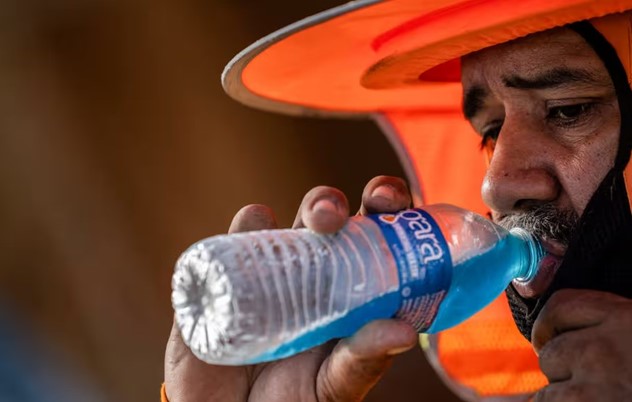
- US workers launch Heat Week to fight for ‘the right to water, shade and rest'
In probably the hottest summer ever, workers are organizing in 13 cities to raise alarm about workplace heat exposure
As temperatures in Baltimore neared 100F earlier this month, 36-year-old sanitation worker Ronald Silver II died after he was found lying on the hood of a car and asking for water.
It's the kind of tragic workplace heat-related death that advocates say could have been avoided with the right labor protections. So this week, during what will probably be the US's hottest summer on record, frontline workers are organizing actions in 13 cities across the country, raising the alarm about workplace heat exposure.
"We have to keep struggling until the right to water, shade and rest is given to all workers in this country," Lourdes Cardenas, an agricultural worker with United Farm Workers in California, told reporters on Monday speaking via translator.
As part of Heat Week, Cardenas and other farm workers are joining fast-food workers represented by the Union of Southern Service Workers and Starbucks Workers United, as well as laborers from other sectors, to lead marches and town halls.
Airport service workers will deliver letters to the country's four largest airlines calling for heat protections, and on Thursday, workers and allies from across sectors will take a coordinated drink of water in a display of solidarity aimed at showing the importance of workplace heat safety.
The campaign comes one month after the White House revealed a long-anticipated proposal to establish the country's first-ever federal workplace heat standard, which, if finalized, would require access to water, shade, breaks and training for about 36 million workers. But the rule could take many months for the Occupational Safety and Health Administration (Osha) to finalize, and could be torpedoed by Donald Trump if he wins November's presidential election.
"When and if it's implemented, it will save lives, but only if we hold [the Biden administration] accountable and keep the standard strong," the Service Employees International Union president, April Verrett, said about the proposal on the Monday press call.
Verrett and other Heat Week organizers say the labor movement cannot afford to wait for Osha to finalize those rules. So they are demanding all US employers meet the standards laid out in the Biden administration's heat proposal immediately.
They are also "calling on elected officials at every level to ensure that every worker in their jurisdiction, including public and private sector workers, are shielded from dangerous heat", Verrett said. And they are bringing extreme-heat protections, such as mandatory shade and water breaks, to bargaining tables across the country in an effort to enshrine them in union contracts.
Workers on the press call laid out the risks posed by sweltering workplace temperatures. One of them was Cecilia Ortiz, an airport worker in Phoenix who assists customers with special needs.
Ortiz said she "loves" her job, but that it was "challenging", especially in the heat when she is forced to don a heavy polyester uniform and walk 10 to 15 miles a day while pushing wheelchairs and luggage. Often, she must also stand on jet bridges that connect airport terminal gates to airplanes, where temperatures often reach 100F. Despite these conditions, she said, she is only paid $16 an hour – "poverty wages", she said.
A fast-food worker in Columbia, South Carolina, Shae Parker, said she went on strike last year. "We definitely experienced the heat crisis," said Parker, who said workers were required to wear heavy shirts with aprons, and added that the restaurant's air conditioners were frequently broken and that employees were forced to pay for water.
This year, Parker said she had to leave her shift early and "on a stretcher" to go to the emergency room due to heat exhaustion. She was not paid for the remainder of her shift, she said.
Texas representative Greg Casar, a member of the progressive congressional "Squad" and Green New Deal advocate, also spoke on Monday's call.
"Before I was an elected official, I was a labor organizer, and we organized at workplaces, but unfortunately, I also had to organize vigils to remember fallen workers," he said.
From 1992 to 2022, 986 workers across the United States died from exposure to heat, federal data shows. As the climate crisis pushes up summer temperatures, those numbers could rise dramatically.
Amid rising summer temperatures, workers have increasingly been organizing against excessive heat exposure. But in the absence of better protections, workers such as Baltimore's Ronald Silver II could continue to die, advocates on the call said.
"He was a human being and he deserved better," Verrett said about Silver's death. "This kind of tragedy is unacceptable. It should not take workers dying on the job for employers to act."
Source: The Guardian – URL: https://www.theguardian.com/us-news/article/2024/aug/13/workers-protections-heat-week